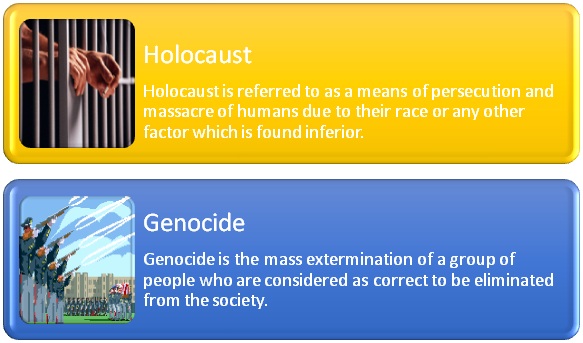Holocaust vs Genocide
Holocaust and genocide are two highly discussed elements in world history, often with obscured differences between them. Both are known as extreme crimes against humanity. The Holocaust originated during Adolf Hitler’s reign, followed by the similar practice of genocide. This article aims to explore the definitions of Holocaust and genocide, as well as their differences. Despite the distinctions between the two, they share similarities in terms of the mass killings committed during both events.
What is a Holocaust?
The Holocaust began in 1933 when Adolf Hitler gained ruling power in Germany. It refers to the persecution and massacre of humans due to their race or any other factor considered inferior. During Hitler’s time, the Nazis, an ethnicity deemed superior, began to exterminate Jews, an ethnicity labeled racially inferior. Thousands of Jews lost their lives in the Nazi Holocaust. Historical records estimate that around six million Jews were massacred by Nazis, along with a total of about eleven million people killed in the Holocaust. The number of Jews killed by Nazis was approximately two-thirds of the Jewish population in Europe. The elimination process of Jews occurred gradually, first by persecuting and banning their businesses, then excluding them from public life, and eventually imprisoning and murdering them.
What is a Genocide?
Genocide refers to the crime known as the cruelest act ever committed against humanity. It involves the mass extermination of a group of people considered fit for elimination from society. Through genocide, a selected group of people are entirely exterminated, becoming an extinct group. Genocide originated in 1943 as a type of massacre that occurred after the Nazis’ Holocaust. The term “genocide” was coined by a Jewish-Polish lawyer named Dr. Lemkin, whose entire family, except for his brother and himself, was murdered in the Holocaust. He later launched a campaign to draw attention to the cruelty of genocide and subsequently legalized it as a crime under UN international law between 1948 and 1951. World history records three genocides.
Key Takeaways
- Holocaust and genocide both involve mass killings of people due to ethnic, racial, religious, or sexual reasons with the intent of exterminating an entire group.
- Genocide is the general term for these mass murders, while the Holocaust specifically refers to the extermination of Jews by Nazis during Adolf Hitler’s rule.
- Genocide is now considered a crime, although the Holocaust was not considered a crime at the time.
